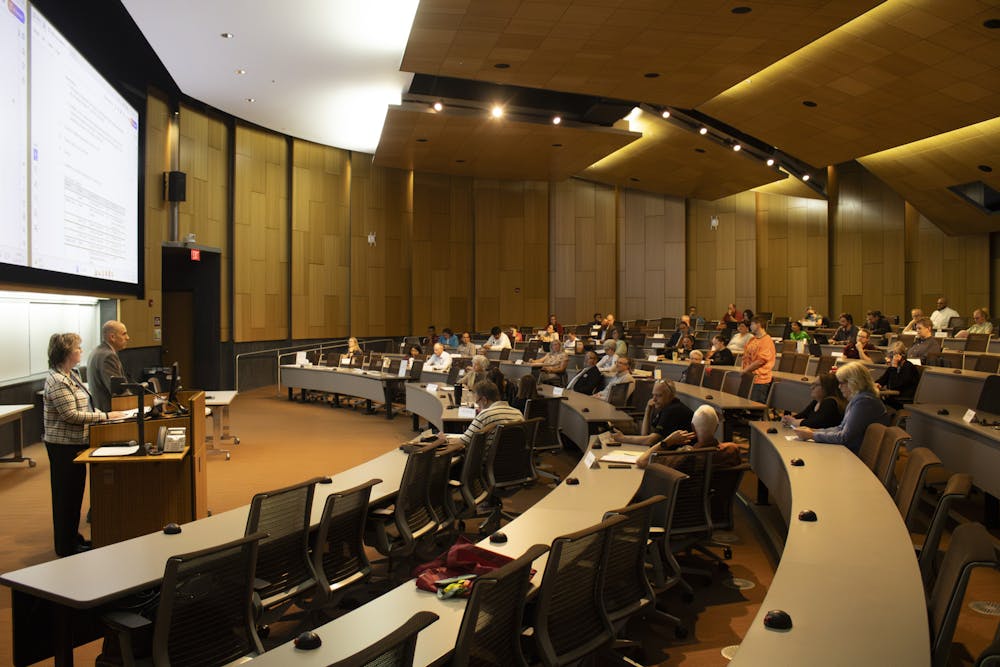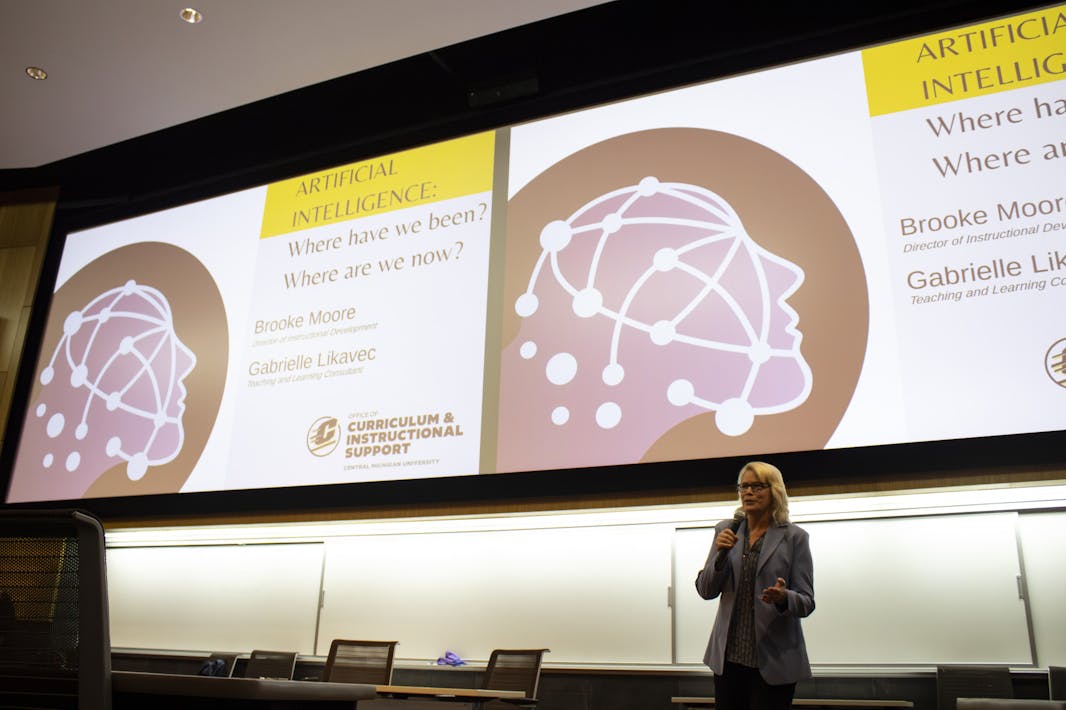Academic Senate shares concerns over home football game on election day

Senators discussing concerns over students in band, dance and on the football team having limited access to voting on Election Day due to home football game during their academic senate meeting on Oct. 29, 2024. (CM Life | Blace Carpenter)
Central Michigan University will be going against Bowling Green State University on Election Day, Nov. 5, and CMU's Academic Senate raised some concerns on whether students involved with the university’s marching band, dance and football team can vote due to the game.
During CMU’s Academic Senate meeting on Tuesday, Oct. 29, the Senate unanimously approved a resolution requiring Senate Chair Stephen Juris to write a letter to the university’s president, provost, athletic director, athletic committee and vice president of government relations addressing the issue of limiting students' access to voting due events on Election Day.
Senator Tracy Davis said it's important that the university take note of this issue and not limit students' availability to vote in future elections.
“If that’s something that happens again next year, then we really do need to make sure this is someone’s radar,” Davis said. “Because this will continue to happen year after year, and while next year may not seem like a major election, every election is a big election.”
In 2018, the Senate passed a resolution requested by the Campus Vote Project Collation. The resolution asked faculty members to excuse any students who were absent from class due to voting and suspend any exams, presentations and major in-class assignments on Election Day.
Assistant Drum Major for the CMU Marching Band Harry Krafchak is also the Central Civics student coordinator for CMU’s volunteer center and has helped students around campus register to vote throughout this semester. After seeing that there was a game on Election Day, he helped members of the band, athletic department and dance team get resources on how to vote early.
“We sent presentations to athletics and to dance on where they can find information on voting out of state because a lot of our football players are from out of state,” Krafchak said. “That was one of the first things I did when we got here.”
Quad leader for the band's drumline Dennis Bulger said despite the resources and preparation for early voting, students involved with the game are limited regardless.
“I mean isn’t that the definition of voter oppression?” Bulger said. “We’re literally stopping people from going to their hometown and getting their vote in.”
Senate discusses AI in higher education
CMU Director of Instructional Development Brooke Moore and Teaching and Learning Consultant Gabrielle Likavec spoke during the meeting about how artificial intelligence (AI) is being used in the classroom and how the university is keeping the community informed about the rapidly growing field.

CMU Director of Instructional Development Brooke Moore giving a presentation on the use of artificial intelligence during the academic senate meeting on Oct. 29, 2024. (CM Life | Blace Carpenter)
During the presentation, Likavec explained how faculty can address cheating with the use of AI.
“A cheater is going to cheat, and it doesn’t matter if it’s AI or it’s Google, they’re going to behave the same way,” Likavec said. “Just like we explain when to use a calculator, when to use spell check and when to use email. We have to explain when to use that tool.”
Likavec shared that she and her team have hosted several workshops in the past few semesters informing the CMU community about the use of AI and its future in higher education.
In the spring, her team will be hosting a book discussion on ‘Co-intelligence’ by Ethan Malik and two workshops around technology and learning more about AI tools.
Students, faculty and staff can visit CMU’s website to learn more about the university’s use of AI.
“This is a very rapid changing topic and we’re so excited to be able to continue to update and share with those with you,” Likavec said.
Provost Lancaster talks about the presidential change
In her first report without outgoing CMU President Bob Davies, Provost Paula Lancaster wanted to talk about the university’s transition to President-elect Neil MacKinnon. She said that both Davies and MacKinnon have been working to try to make the transition as smooth as possible.
“I will say from my perspective, I think (Davies) has more than delivered on his commitment to ensure a really smooth transition,” Lancaster said. “He’s been just amazing, hasn’t slowed down a bit … I’ve been very honored to be part of that process. In my limited experience and meetings with President MacKinnon, the same thing is happening.”
She continued to say that MacKinnon has been doing well in “getting up to speed” before he assumes his new position.
Davies wasn’t in attendance during the meeting due to a business trip on behalf of the university. His last day as CMU’s president is Nov. 1.
Senate removes Early Education Master’s Program
The Senate had unanimously voted on removing Early Education from its master’s program. In 2018, the program was put on hiatus and has now been deleted from CMU’s curriculum.
Senator Scott Roberts thanked and acknowledged his colleague Krystyna Nowak-Fabrykowski for her hard work in creating and fighting for this program
“I want to thank Krystyna for her hard work and the development of this program and we’re all sorry that we had to delete it,” Roberts said. “She is going to be able to continue in a different form, in the master’s of curriculum instruction.”
Future Academic Senate meetings will occur at 3:30 p.m. every other Tuesday at the Education and Human Services Building in the French Auditorium. Livestreams of the meeting and all future meetings can be found on CMU’s website.



